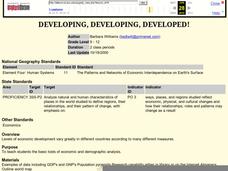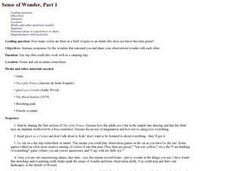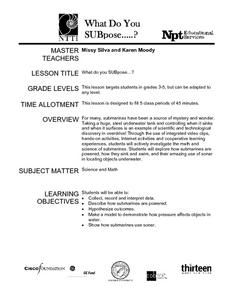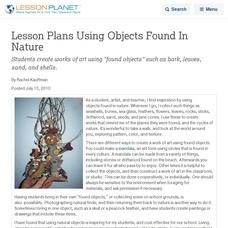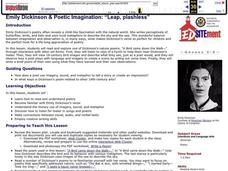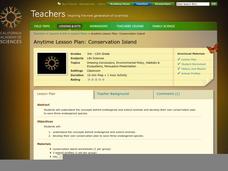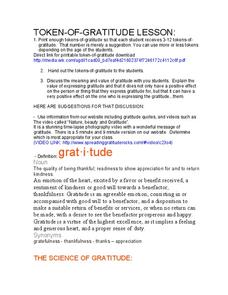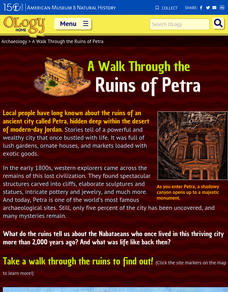Cornell University
Polymers: Making Silly Putty
Putty is proof that learning can be fun! Share the wonderful world of polymers with your class through an experiment. Young scientists create their own silly putty, then examine its properties.
Curated OER
Developing, Developing, Developed!
Students differentiate among and explain various levels of economic development around the world. They see that levels of economic development vary greatly in different countries according to many different measures.
Curated OER
The Legendary Raptors
How are raptors and airplanes alike? Combine science and language arts in this fun and interactive project. Young scientists research the animal in order to design their own aircraft, and compete in a contest for farthest, fastest, and...
University of North Carolina
Religious Studies
What is the difference between religion and religious studies? Readers find out after reading an online handout. It outlines common assignments in religious studies classes, such as critically evaluating religious texts and writing...
Curated OER
Sense of Wonder, Part 1
Students engage in an activity by using a leading question. They increase awareness for the wonders that are part of the real world. This is based upon personal observations that students make.
Curated OER
The Wonderful World of Polymers
Seventh graders investigate the concept of polymers. They discover unique properties and how polymers are natural. The lesson plan contains sufficient background information for the teacher. Students examine different types of materials...
Curated OER
World Marriage Day
In this World Marriage Day activity, students read or listen to a passage, then match phrases, fill in the blanks, choose the correct word, unscramble words and sentences, put sentences in order, write discussion questions and conduct a...
Curated OER
A World of Feathered Friends
students will learn to
respect the nature around them. This respect is vital because ignorance of surrounding
nature can lead to carelessness when curiosity goes awry. A perfect example of this
wayward curiosity took place at our school...
Curated OER
Seven Up
Learners investigate the symbolism of the Seven Wonders of the Ancient World, and evaluate modern "wonders of the world." In small groups, they complete a data chart on a selected Wonder, create a poster from the data, and prepare a...
Curated OER
The Wonderful World of Slugs
Examine a slug? Of course, what else would a 2nd grader do with it? Pupils use clues and go on a slug hunt, read a slug story, or make a cooperative group mural of a slug's habitat. While older learners catalog slugs, go on a slug hunt,...
Curated OER
What Do You SUBpose?
Submarines are the fous of this math and science activity. In it, learners explore the world of submarines: how they work, and what they are used for. They engage in hands-on activities, watch video clips, and work in cooperative groups...
Curated OER
Lesson Plans Using Objects Found In Nature
Students create works of art using "found objects" such as bark, leaves, sand, and shells.
Curated OER
Great Barrier Reef
Ninth graders read text imbedded in this plan and find the answers to 3 questions: Why is the Great Barrier Reef one of the natural wonders of the world? What value does the reef offer Australia's economy? How is the reef being damaged?
Curated OER
Personal Written Response Activity
Students complete a final written project. In this personal response lesson, students respond in a creative way to one of the issues presented in the unit. Students may choose to create a series of postcards from a natural...
Curated OER
Geography Experience: Low Vision
The world is a big and beautiful place; but how do you begin to understand it when you have low vision? Here is a great set of ideas focused on transforming any small room into a sensory paradise, themed to incite understanding about...
Curated OER
"Leap, Plashless": Emily Dickinson & Poetic Imagination
Young scholars read and explore one of Emily Dickinson's nature poems, "A Bird Came Down the Walk-" through interaction with a variety of art forms. Clips of a hymn to hear meter and the viewing of bird images exposes them to the...
American Museum of Natural History
Saving Species
Some scientists dedicate their lives to researching and protecting endangered species. An online lesson teaches about three scientists around the world who do just that. They learn about spiders, mollusks, and reptiles from North...
California Academy of Science
Conservation Island
Why not walk in the footsteps of Teddy Roosevelt and become a conservationist? After discussing issues and reasons for animal extinction, the class creates their own conservation plans. Each small group is given mock data regarding a...
American Museum of Natural History
Fascinating Fish
A fish is not just a fish. So many fish in remote places have unique characteristics. Take a trip with an ichthyologist to the Congo River to discover the species of one of the most diverse fish populations in the world. The online...
Curated OER
Project-Based Learning and the Arts
What's so great about Project-Based learning? Read to learn how projects can help kids apply higher-order thinking skills, conduct thoughtful investigations, and make cross curricular connections. This short article includes five...
Facts and Files
The Nile
While it may not be possible to take an entire class to Egypt and explore the ancient wonders, it is possible to engage your young historians in activities that ask them to research these and other antiquities and place them on their...
Spreading Gratitude Rocks
Token of Gratitude
What would the world be like if everyone expressed gratitude? Pupils explore the concept by watching a motivating time-lapse video. Scholars express appreciation by handing out tokens of gratitude, and then write about their...
American Museum of Natural History
A Walk Through the Ruins of Petra
Walking through the ancient Nabataean city of Petra can be a challenge. A tour begins with a 20-minute walk down a rocky slope through the narrow Siq to get to the famous Treasury known to Indiana Jones fans. But that is...
Curated OER
Looking at Landforms-Based on the Washington Quarter Reverse
Learners use a Washington State Quarter to examine different landforms and discuss natural resources. After a class discussion on the items found on a Washington State quarter, students brainstorm a list of natural resources found in...



